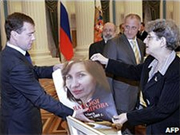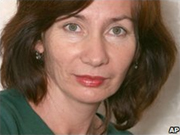
Mr Medvedev has sought reforms since the death of Natalya Estemirova

Natalya Estemirova was a vocal critic of human rights abuses in Chechnya |
 Award highlights Russia's rights threat Award highlights Russia's rights threat
Mr Medvedev has sought reforms since the death of Natalya Estemirova Memorial, which has won the European Union's Sakharov Prize, is one of the few human rights groups in Russia willing to speak out about cases of alleged kidnapping, torture and extrajudicial killings by Russian forces.
The European Parliament, announcing the prestigious award, said it was intended to signal that all such groups in Russia should be free to voice their thoughts without fear or violent reprisals.
Memorial chairman Oleg Orlov, who was cited personally by the awarding panel, said the prize inspired the organisation to continue working despite the constant setbacks and obstacles put in its way by the Russian government.
"It is very important for us. It is a recognition of how important our work is," he said.
"It assures us that we are moving in the right direction in these difficult times. Sometimes we feel like giving up. We work hard, but we fail to achieve any significant results." High-profile murders Memorial is the largest human rights group in Russia. Its offices have been raided, it has been issued with lawsuits and some of its workers have been attacked and killed. Natalya Estemirova, who worked for Memorial in Chechnya, was one of those victims.
Memorial is the largest human rights group in Russia. Its offices have been raided, it has been issued with lawsuits and some of its workers have been attacked and killed. Natalya Estemirova, who worked for Memorial in Chechnya, was one of those victims.
In July this year she was abducted from her home, shot several times in the head and her body was dumped in a forest in the neighbouring republic of Ingushetia. Her attackers have so far not been found.
For Memorial, her death meant the end of its presence in the region. It was too dangerous to send anyone to replace her.
But Natalya Estemirova is simply the latest in a string of high-profile murders and beatings across Russia. Over the past three years - notably since the death of journalist Anna Politkovskaya in 2006 - others have died too. Just two months ago Maksharip Aushev, who campaigned against abuses by security forces in the republic of Ingushetia, died in a hail of bullets fired from a passing car.
Others include human rights lawyer Stanislav Markelov, shot dead on a Moscow street, journalists such as Anastasia Baburova, also shot dead, and Zarema Sadoulaeva, head of the Chechen organisation Save the Generation, found shot dead with her husband in Grozny. Za Prava Cheloveka, another Russian human rights group, is led by Lev Ponomaryev, one of the founders of Memorial and a Soviet-era dissident.
He concentrates on defending prisoners and highlighting their conditions. Just this year he has dealt with a lawsuit, an attempted eviction by the Moscow authorities and survived a severe beating by unknown attackers. "If you compare it with the Soviet Union I think Russia today is a far more frightening place for human rights activists," he said. "Then you could go to prison for a long time but they didn't kill people. Now they kill human rights activists. You might get a bullet in the head or you could be beaten like I was.
"I was beaten up by three men who silently kicked me in the head until I lost consciousness. It turned out I had been watched and then ambushed. It was no accident."
Presidential backing Russian President Dmitry Medvedev has spoken publicly of the need for non-governmental organisations to be respected and funded by the government. He has also appointed the human rights ombudsman for a second term and created a new position of children's rights ombudsman.
There is also a new draft law that aims to repeal some of the restrictions placed on NGOs during the presidency of current Prime Minister Vladimir Putin. Funding would be something that Memorial would be keen to see coming its way, but groups such as Memorial are often characterised by officials and sceptics as being Western-funded covers for spies - a trend sparked by comments made by Mr Putin himself several years ago.
"The government thinks that those who get money from abroad are suspicious and those that don't aren't," said Oleg Orlov. "Who gets money from abroad? Human rights organisations who criticise the government's human rights record. These groups cannot get money from inside Russia."
So a 50,000-euro ($72,800; £40,000) prize from the European parliament - although welcome on one level - will only feed official suspicion that Memorial fits into that suspect category.
(BBC News/ Daniel Fisher/ Moscow) |






